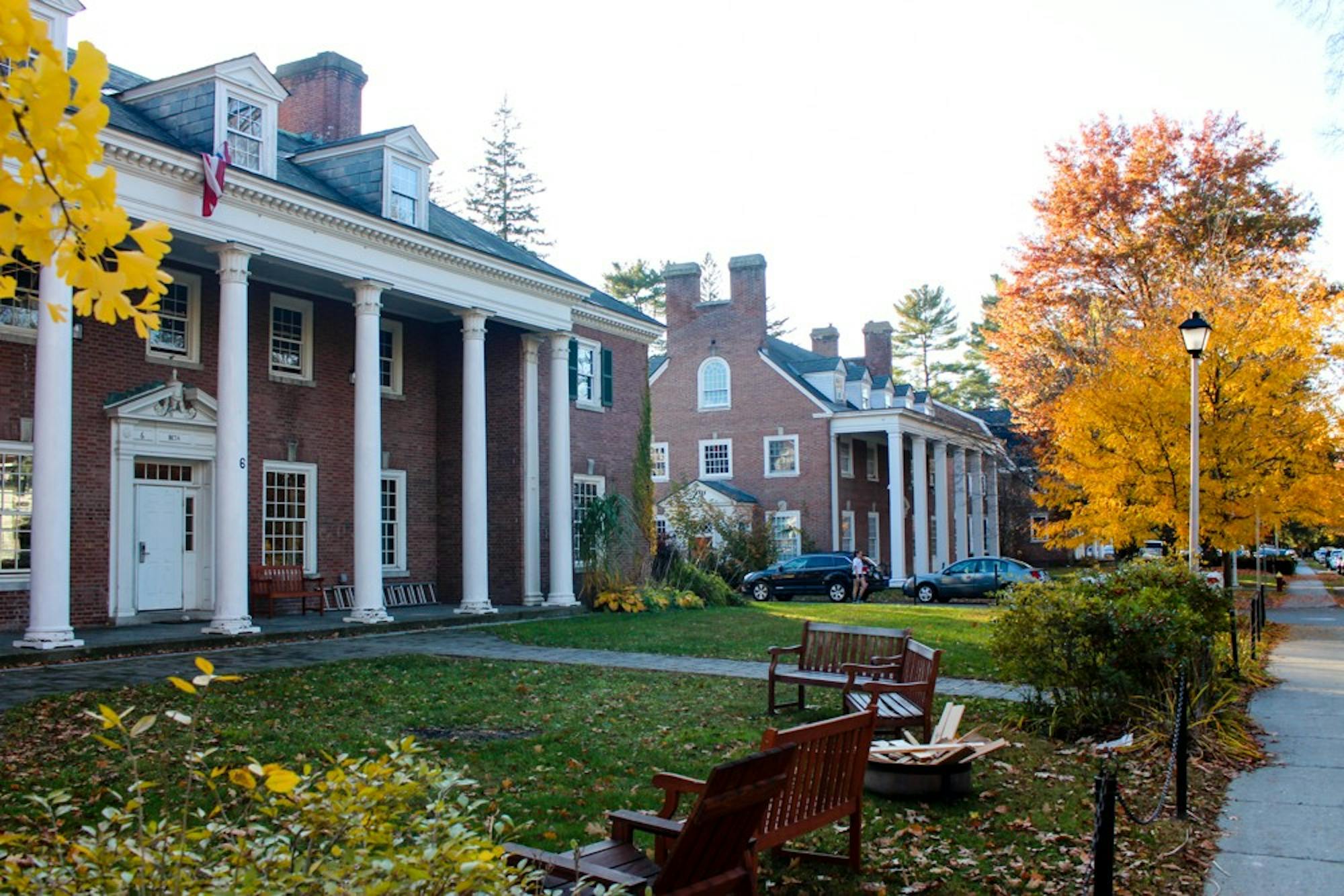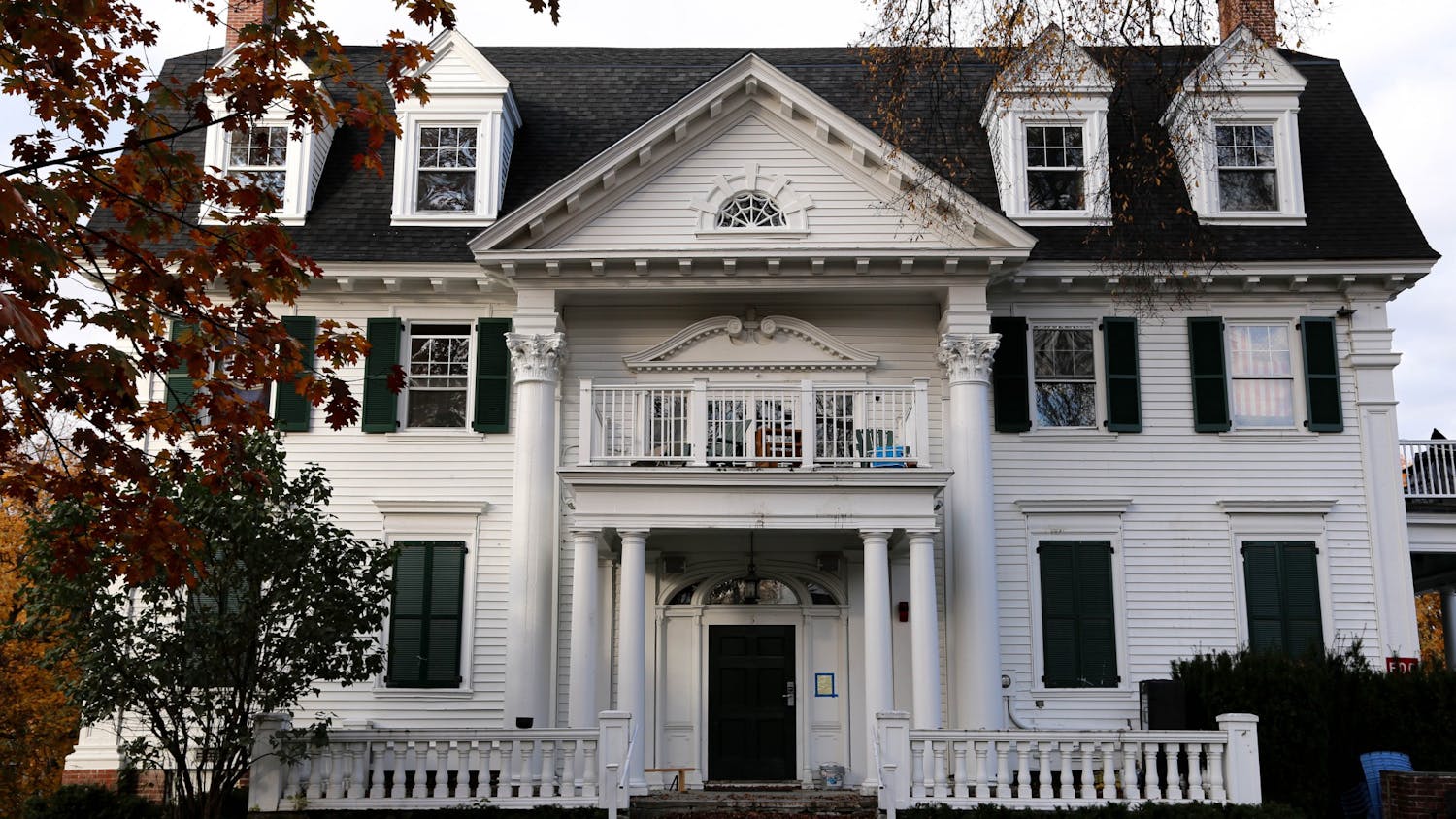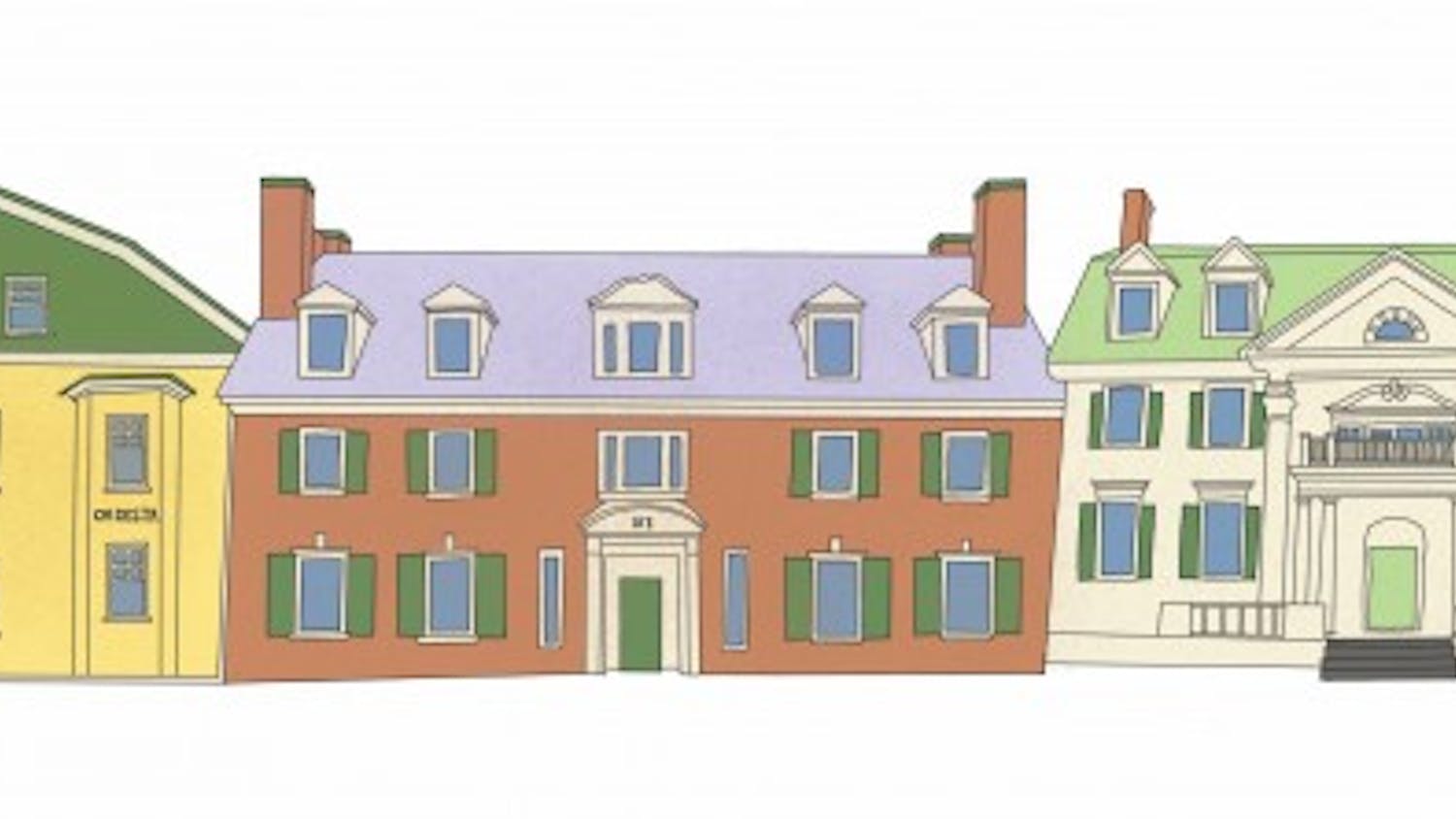This article is featured in the 2020 Freshman special issue.
Remote learning is bringing an additional dramatic change for the roughly two-thirds of eligible Dartmouth students who are members of a Greek organization.
Despite their long history at the College, Greek organizations are undergoing significant adaptations in response to a remote rush process, increased financial pressure and growing calls for inclusion and diversity. As the system's future remains unclear, it seems likely that Greek life at Dartmouth is facing a turning point in response to ongoing pressures.
History of Greek life at Dartmouth
Greek life has had a long and complicated relationship with the College. It has survived several abolition efforts, experienced system-wide reforms and yet remains a centerpiece of many students’ Dartmouth experience.
It began at Dartmouth in the 1780s in the form of two “literary societies.” These organizations, which brought students together for reading and socialization, were eventually incorporated into the present-day libraries, but two groups split off to found the first fraternities, Psi Upsilon and Kappa Kappa Kappa, in 1842.
Greek life at Dartmouth has since expanded to include 26 active chapters today — 13 fraternities, 10 sororities and three gender-neutral houses. Greek life at Dartmouth includes local houses, which govern themselves without affiliating with a nationwide organization, and national houses, which share a set of bylaws with chapters across the country.
Recent attempts at Greek life reform have stemmed from the Moving Dartmouth Forward initiative started in 2015 by College President Phil Hanlon. This effort included several significant changes, including a campus-wide hard alcohol ban, the beginning of the residential house system and a four-year sexual assault prevention program.
Certain policies that Dartmouth Greek houses follow are intended to make the system more inclusive. Fraternities have long implemented an “open door policy,” meaning that any students can get into a publicly listed party — although invite-only events still exist. The “frat ban,” adopted by the Greek Leadership Council in 2012, prohibits Dartmouth freshmen from participating in Greek events during the first six weeks of their freshman fall term or before Homecoming, whichever comes later.
In recent years, two houses have been derecognized after coming under increased scrutiny from the College. Alpha Delta — known for being an inspiration for the 1978 comedy “National Lampoon’s Animal House” — was derecognized in 2015 for branding new members and violating the terms of a previous suspension. Shortly after, Sigma Alpha Epsilon fraternity was derecognized in 2016 after a series of investigations by the college, a viral Rolling Stone article featuring the fraternity and years of health and safety violations. SAE’s former house is still present and occupied on campus and its members are affiliated under the name “Scarlett Hall.”
Greek houses at Dartmouth have undergone several other controversies over the years, including AD and Delta Delta Delta sorority — now known as Chi Delta — hosting a “Bloods and Crips” themed party in 2014 and an annual “Phiesta” event, jointly hosted by Alpha Phi sorority and Phi Delta Alpha fraternity, that was discontinued in 2014.
Despite these controversies, Dartmouth’s Greek system has survived several attempts to abolish it, largely due to students’ opposition to the idea. In 1999, then-College President James Wright announced an initiative to end the single-sex Greek system, but after 1,000 students gathered in protest on Wright’s lawn, the initiative was abandoned.
Greek Life at Dartmouth has survived several attempts to abolish the system in part because many students find their experience with Greek life to be especially meaningful.
Chi Gamma Epsilon fraternity president Dean Anderson ’21 said that he was originally nervous about joining Greek life as an openly gay man. However, he now believes his fraternity helped him to meet “this incredibly diverse, smart and kind group of people” that “have [his] back, no matter what.”
“[My] house really allowed me to step into who I am as a person and who I want to be as a person,” Anderson said.
Likewise, Epsilon Kappa Theta sorority president Megan Ungerman ’21 described EKT as a “big family” and a place for “people who need a home at Dartmouth.”
Kappa Kappa Gamma sorority president Caroline Smith ’21 emphasized the importance of her Greek community during her time away from Dartmouth.
“The community of a Greek space has been nice to have during this uncertain time,” Smith wrote in an email statement.
Some unaffiliated students, however, note that at times Greek houses can feel more exclusive than welcoming.
Emma Kallman ’22, who rushed her sophomore fall but was barred from rushing again for a year after turning down a bid, said that being unaffiliated can be difficult.
“It sometimes just seems like there’s this ingroup that you’re not a part of,” Kallman said, “and people have all these stories, and there’s this culture that you just can’t necessarily partake in.”
Valerie Truong ’21 said that she has also felt “implicitly excluded” before at Greek houses because it isn’t her idea of an ideal social scene.
“It’s not a space for people like me, perhaps,” Truong said. “I don’t say that just because of my physical identities, but … if I don’t like the kind of music they’re playing, or if I don’t like how crowded it is, or if I don’t like the smell in the basement, it’s too late at night — it doesn’t fit with my idea of how I want to spend my time.”
Both Kallman and Truong emphasized that students can have active social lives without joining Greek organizations.
“I knew that if I wanted to [spend time in Greek spaces] at any time, if I wanted to go to a frat party or anything like that, I could always just tag along with my friends who were affiliated, or even just show up with friends — even if they weren’t affiliated,” Truong said.
Greek houses make attempts at inclusivity
In response to the ongoing Black Lives Matter protests, many Greek organizations are considering how they fit into a larger dialogue around race. At other colleges across the country, protests have led to calls to reform or abolish Greek life, which is seen by some as perpetuating discriminatory practices and largely white social spaces.
Truong, for example, said that she has noticed some houses, though not all, “aren’t very diverse.”
“I’ve been in some spaces where it’s like, OK, nobody here looks like me,” Truong, who is Asian American, said, “and it’s a little shocking because it’s very different than when you’re just walking around campus.”
At Dartmouth, some Greek houses are attempting to actively engage with racial justice issues.
Smith wrote that “as an institution with a discriminatory past, we have to actively and constantly work towards more diversity, equity and inclusion.”
According to Smith, Kappa has been working to promote inclusivity by adding a diversity, equity and inclusion vice president position, “discussing anti-racism resources” within the sorority and donating to “70+ community bail funds, mutual aid funds and racial justice organizations in the early summer.”
Anderson said that Chi Gam was able to raise “nearly $10,000 for racial justice.” He added that the house held a “mediated discussion” on race this summer and has established an anti-racism book club.
Ungerman said that EKT has continued ongoing conversations about race issues within the house but added that being inside the Greek system creates limitations for how much a push for racial justice can achieve.
“Of course we’re still in the Greek system, so we’re not independent from how it was made and what it still stands for,” Ungerman said. “We are definitely still cognizant of that.”
Theta Delta Chi president Jarett Lewis ’21 said that while the open door policy exists, “that doesn’t necessarily mean that everyone feels comfortable at TDX, and a lot of us have spoken about that and have recognized that and are hoping to make it a better place when we all get back.”
According to Lewis, TDX is removing all images from the house that feature the Native American as the former athletic symbol of Dartmouth. He also said that the house has started an internal judicial committee for members and has created a diversity and inclusion position in leadership.
More broadly, Lewis noted that TDX had a two-hour call where members discussed “all of [their] traditions and events” to reflect on efforts they could take to increase the house’s inclusivity. However, he added that “as of now it’s kinda of all talk, we haven’t been able to get back and implement [these changes] yet.”
Alpha Chi Alpha fraternity and Kappa Delta Epsilon sorority led the “20X Challenge” this summer, which provided 20 days of programming that included educational discussions around diversity and inclusion and fundraising for charitable organizations. All Interfraternity Council and Inter-Sorority Council houses, as well as Scarlett Hall, were involved in the discussions.
The challenge ultimately raised $22,000, exceeding its $20,000 goal. No specific changes to the Greek system have been announced as a result of the 20X Challenge.
“I think it’s a good thing that these conversations are happening,” Truong said of the 20X Challenge, “but I think they should be happening regardless of national protests.” She added that any organization, Greek or not, should be considering its values and how it can be more inclusive.
Several student leaders of the 20X Challenge declined to comment or could not be reached for comment for this story.
Smith wrote that Kappa is moving forward from its conversations by analyzing finances, recruitment, events and other parts of the sorority “through a critical lens.”
Lewis addressed rush specifically.
“We’re hoping to engage a larger group of guys,” he said, adding that while TDX has traditionally been a lacrosse and rugby house, he hopes to “drum up some interest from people [that members] haven’t normally spent time with.”
Questions have also been raised about the inclusion of members of the LGBTQ+ community. Ungerman said that “the traditional [Greek house] is largely heteronormative” and added that EKT is especially important within this community due to its “large queer membership.”
Sororities in particular faced challenges this spring regarding the inclusion of non-binary potential new members.
Last April, concerns were brought up around female-specific language used throughout the rush process. Several debates followed within the ISC and its member houses regarding the place that non-binary students should have within the larger sorority system.
While ISC bylaws state that “any Dartmouth undergraduate who identifies as a woman and/or gender non-conforming person may participate in Formal Recruitment,” the ISC decided this spring that this rule did not necessarily mean a house has to be willing to accept non-binary people that participate in recruitment. Following subsequent discussions, all local sororities amended their own bylaws to include language that would allow non-binary members. However, national chapters did not, in part because national bylaws use the word “women” when describing PNMs, implying that non-binary students are not necessarily eligible for national sorority membership.
The ISC said in an email about rush this year that non-binary PNMs will only be required to attend events at the four houses that are allowed to extend bids to them, a change from previous years when all PNMs were required to visit all eight houses.
Future of Greek life at Dartmouth
Fallout from pushes for increased inclusivity, the COVID-19 pandemic and financial struggles all look likely to cause changes in Greek life at Dartmouth in the near future.
In terms of finances, some houses are struggling as members are more hesitant to pay traditional house dues for a remote experience.
Anderson noted that Chi Gam was able to negotiate for a refund on their property insurance because no one was in the house over the remote terms. He added that they were able to raise money from alumni and have recently grown their membership, which contributed to their financial stability. For the upcoming year, Chi Gam will only charge dues for those living in the house, Anderson said.
Local sororities also faced challenges with paying off their insurance premiums. Many of these sororities banded together this spring to negotiate a reduction of insurance payments with the College.
Rush will look dramatically different than previous years: All rush events will be entirely remote. According to emails sent to the student body by the IFC and ISC, the fall will see some pre-rush events — a step down from previous years, when the bulk of rush took place during the fall. Sorority rush and the fraternities’ “shake-out” process will take place in the winter.
Regarding the shift to a remote community, Ungerman said, “I don’t think Greek life is ever going to be the same as it was before.”
Both Smith and Lewis said that their respective houses have managed to stay in touch despite the shift to a remote community. Programming included regular virtual meetings, philanthropy events, quarantine tips and conversations about potential changes for the houses upon return to an in-person format.
“We did more than I could have imagined we could under the circumstances,” Smith wrote.
Ungerman expressed mixed feelings about the ’24s’ introduction to the Greek system.
“The freshmen aren’t going to really be able to see what Dartmouth Greek life is about,” Ungerman said. “But maybe that’s for the better.”
Ungerman urged students to consider the recent calls for the abolition of Greek life at other schools, such as the University of Pennsylvania, and their potential implications at Dartmouth.
“The ’24s get to make Dartmouth their own, so [they] all can really decide what [they] want,” Ungerman said.
Anderson also touched on the uniqueness of Dartmouth Greek life, saying that he “wouldn’t have rushed had [he] not been at Dartmouth.”
He praised Dartmouth’s elongated rush process during sophomore year, which allows PNMs to “get a lot more exposure to the real side of a fraternity or sorority” as compared to “expedited” week-long processes during freshman year as is common at other schools — all other members of the Ivy League, for example, allow freshmen to rush.
That being said, much of the routine has been disrupted by the remote spring term, where, Anderson noted, many freshmen would have usually gotten the chance to meet upperclassmen.
EKT is planning some remote sorority programming for the fall term that will be open to ’24s and the rest of campus, according to Ungerman. However, Ungerman said that rush might be “weird,” but it will be “interesting to see how it all shakes out.”
Regarding the direction of his house as a whole, Lewis said that Greek houses need to aim to be more involved in their communities so they can “be a presence on campus and not just a place to drink.” He added that he hopes that Greek houses can come together to have a larger impact as a united system rather than “just staying in their own corners of campus.”
Smith described the past few months as a “wake-up call,” writing that “a lot is changing in Greek life at Dartmouth, and a lot for the better.”
“People are really going to have to think about what their values are and why they are involved in Greek life,” Ungerman said of potential changes to Greek life. “Are they involved just to party and go out? Because that’s going to look a lot different. Or are they involved in Greek life because that’s where they found a community of people?”
Chi Delta sorority president Isabella Frohlich ’21 and ISC president Mahalia Dalmage ’21 declined to comment for this story. The presidents of all other recognized fraternities, sororities and the IFC did not reply to requests for comment. Director of the Office of Greek Life Brian Joyce deferred comment to members of the Greek Leadership Council.
Kyle Mullins contributed reporting. Valerie Truong is a former member of The Dartmouth staff.
Correction appended (Jan. 31, 2020): A previous version of this article referred to the former site of Sigma Alpha Epsilon fraternity as "Scarlet Hall." The article has been updated to reflect the correct spelling of the house's name, "Scarlett Hall."




